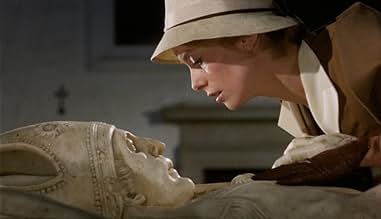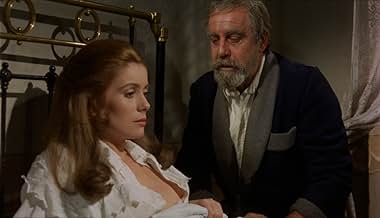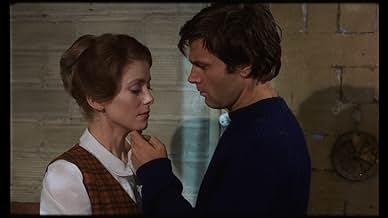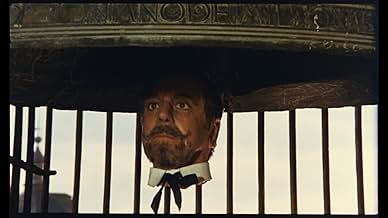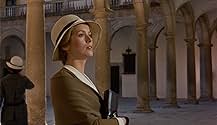Pouco depois da morte de sua mãe, uma jovem inocente encontra refúgio na casa de seu aristocrático tutor de meia-idade, que a submete a seus avanços sexuais.Pouco depois da morte de sua mãe, uma jovem inocente encontra refúgio na casa de seu aristocrático tutor de meia-idade, que a submete a seus avanços sexuais.Pouco depois da morte de sua mãe, uma jovem inocente encontra refúgio na casa de seu aristocrático tutor de meia-idade, que a submete a seus avanços sexuais.
- Direção
- Roteiristas
- Artistas
- Indicado a 1 Oscar
- 11 vitórias e 4 indicações no total
- Muchacha
- (as María Paz Pondal)
- Don Cándido
- (as Juan José Menéndez)
- Direção
- Roteiristas
- Elenco e equipe completos
- Produção, bilheteria e muito mais no IMDbPro
Avaliações em destaque
One thing that's extraordinary about how Bunuel directs and allows for his actors to play the scenes is that the emotions are only heightened to a certain level, and never with the aid of things like music or tears. It is what it is: Don Lope has taken care of Tristana as her guardian since her mother died, and now has inserted himself as her father/husband figure, with his servant Saturna (stern-faced but understanding Lola Gaos) a kind of unofficial confessional. Tristana wants some freedom, just to go out and walk around, and feels caught by Don Lope even when not doing anything... until she meets Franco Nero's Don Horacio, a painter who could promise a new life. This goes without saying that one should take it for granted that Tristana isn't *that* young and could take care of herself without Lope, but maybe this is part of the point of the slight absurdity- and eventual tragedy- of this struggle.
Two years go by after she leaves Lope for Horacio, with a tumor in her leg. She's now a cripple, and now once again a kind of mental prisoner in Lope's home; the complexity of old man Lope as being duplicitous is seen right after he finds out she's sick and Horacio asks for Lope to help keep her home, and he nearly skips home saying "she'll never leave again!" All of this, leading up to a final twist that is very satisfying if extending the tragic dimension of Lope and Tristana, would be soapy and tawdry and, possibly, very standard in other hands. For Bunuel, there's a lot of personal ground here; I wonder at times if Rey is a little like one of those actors a director of Bunuel's auteur-stature uses as a means of expressing himself through an actor, or if it's just because he's so good at playing wicked AND sympathetic bourgeois. And the mixture of ideas, if not really themes, covering what's love and over-control, religion, deformity, a free will are potent and exciting even in such subtle and (as Maltin said) serenely filmed territory.
It's also a minor triumph for Deneuve, who between this and Belle de jour did some of her best work as an actress for the notorious surrealist. Her character's continual dream of Lope's beheaded top dangling from a church tower is the closest we see to a classic surrealist scene, though it's reminiscent of Los Olvidados as brilliantly expressing one character's mind-set. Deneuve is up for the challenge of putting up a tough interior and exterior presence; she gets paler towards the end (if this was for real or just a bad print I couldn't tell), and there's a lot of pain in her eyes and expression throughout. It's great work for one of the director's most subtly demanding works- beneath its conventional framework of a love-triangle story is sorrow and horror at the human condition.
7/10
Buñuel's attention to detail is extraordinary. Every scene is packed with visual interest. In some strange way, the decor forms an essential part of the structure; it is a facet of Buñuel's unique vision. Moreover, he not only knows exactly when to end a sequence, but how to end it. For instance, when Don Lope (Rey) puts down the dog and walks away, the camera follows not him but the dog: an endearing and brilliant touch, and there are many more. Compelling throughout, even spellbinding.
If this film were a framed picture hanging in a gallery, thousands would come to see it and Buñuel would be acclaimed as a great artist. He was a great artist, in fact, but the cinema is an ephemeral form and people forget. We need to buy the videos and watch these fine movies from time to time, just to remind ourselves that a film can be a significant art form and not merely a commercial product cynically synthesised to extract the largest amount of money from the greatest number of people.
Not the most surrealistic work, yet, probably one of Buñuel's ten most well-made.
Você sabia?
- CuriosidadesLuis Buñuel said that many of Tristana's idiosyncrasies, including her habit of asking people to choose between nearly identical objects, was based on the director's sister's similar habits.
- Citações
Don Lope: Poor workers. Cheated and then beaten. Work is a curse, Saturno. Down with work that you have to do to survive. That work isn't honorable, as some say. All it does is fatten the exploiting swine. However, what you do for pleasure ennobles man. If only we could all work like that. Look at me, I'd rather be hanged than work! So, I live poorly, but I live without working.
- Versões alternativasOriginally released in Europe at 105 minutes.
- Trilhas sonorasÉtude No 12 in C minor, Op 10 'Revolutionary'
Written by Frédéric Chopin
Principais escolhas
- How long is Tristana?Fornecido pela Alexa
Detalhes
- Data de lançamento
- Países de origem
- Central de atendimento oficial
- Idioma
- Também conhecido como
- Tristana
- Locações de filme
- Paseo Recaredo, Toledo, Castilla-La Mancha, Espanha(opening and closing scenes with Saturna, Viridiana and the mute boy)
- Empresas de produção
- Consulte mais créditos da empresa na IMDbPro
Bilheteria
- Faturamento bruto nos EUA e Canadá
- US$ 14.586
- Fim de semana de estreia nos EUA e Canadá
- US$ 4.754
- 14 de out. de 2012
- Faturamento bruto mundial
- US$ 14.586
- Tempo de duração1 hora 39 minutos
- Mixagem de som
- Proporção
- 1.66 : 1


